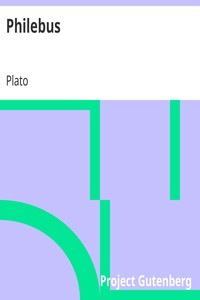Philebus by Plato
"Philebus" by Plato is a philosophical dialogue likely written during the late 4th century BC. The work explores the nature of good, pleasure, and wisdom through a conversation primarily between Socrates and a character named Protarchus, with the interlocutor Philebus representing the position that pleasure is the highest good. The dialogue critically examines various kinds of pleasures and knowledge, ultimately questioning their significance against the backdrop of the ideal good. The opening
of "Philebus" sets the groundwork for this philosophical examination, beginning with a recapitulation of arguments that have already been made regarding the comparative goodness of pleasure and wisdom. Protarchus, who is initially aligned with the hedonistic viewpoint, finds himself challenged by Socrates as they dissect the nature of pleasures, proposing a nuanced classification of pleasures that includes both good and bad variations. Socrates suggests there may exist a higher good beyond both pleasure and wisdom, prompting a deeper inquiry into the characteristics and essence of each. The dialogue is marked by a methodological shift towards abstract analysis, emphasizing classifications and categorizations that lay the foundation for the ensuing debate on what constitutes the ultimate good in human life. (This is an automatically generated summary.)
Read or download for free
| How to read | Url | Size | |||
|---|---|---|---|---|---|
| Read now! | https://www.gutenberg.org/ebooks/1744.html.images | 328 kB | |||
| EPUB3 (E-readers incl. Send-to-Kindle) | https://www.gutenberg.org/ebooks/1744.epub3.images | 149 kB | |||
| EPUB (older E-readers) | https://www.gutenberg.org/ebooks/1744.epub.images | 153 kB | |||
| Kindle | https://www.gutenberg.org/ebooks/1744.kf8.images | 264 kB | |||
| older Kindles | https://www.gutenberg.org/ebooks/1744.kindle.images | 250 kB | |||
| Plain Text UTF-8 | https://www.gutenberg.org/ebooks/1744.txt.utf-8 | 280 kB | |||
| Download HTML (zip) | https://www.gutenberg.org/cache/epub/1744/pg1744-h.zip | 144 kB | |||
| There may be more files related to this item. | |||||
Similar Books
About this eBook
| Author | Plato, 428? BCE-348? BCE |
|---|---|
| Translator | Jowett, Benjamin, 1817-1893 |
| Title | Philebus |
| Note | Reading ease score: 65.0 (8th & 9th grade). Neither easy nor difficult to read. |
| Note | Wikipedia page about this book: https://en.wikipedia.org/wiki/Philebus |
| Note | Socrates |
| Credits | Produced by Sue Asscher, and David Widger |
| Language | English |
| LoC Class | B: Philosophy, Psychology, Religion |
| LoC Class | PA: Language and Literatures: Classical Languages and Literature |
| Subject | Classical literature |
| Subject | Pleasure -- Early works to 1800 |
| Category | Text |
| EBook-No. | 1744 |
| Release Date | May 1, 1999 |
| Most Recently Updated | Jan 16, 2013 |
| Copyright Status | Public domain in the USA. |
| Downloads | 792 downloads in the last 30 days. |
| Project Gutenberg eBooks are always free! | |

